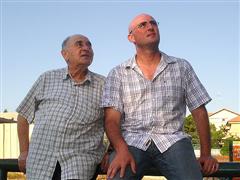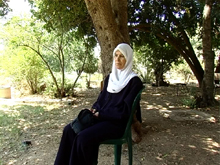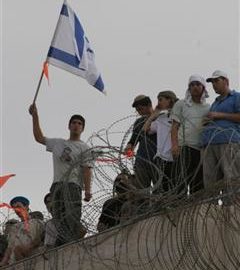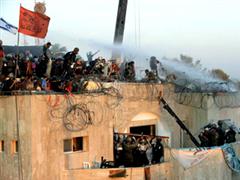The film 1948 is a record of memories of a group of elderly Arabs. The director, Mohammad Bakri, employs poems Mahmoud Darwish. In their own words, the Palestinians interviewed describe the moments when they became refugees. They described the brutality in which they were deported, or the fear of massacre that made them and their families flee for their lives. They speak without blame or even protest.
Archives
A House in Jerusalem
Can a house be a metaphor for Arab-Jewish relations in Israel? Amos Gitai returns to the house in West Jerusalery?m he profiled in 1980. He interviews members of the Jewish families who live there, and he talks with the Arab family who lived in the house until 1948. They are now in East Jerusalem and pay a nearly furtive visit to the street in front of their old house. Gitai also interviews Palestinian laborers at work on renovations and excavating an old tunnel to the Holy Mount. What do people think of each other, what do they think of Israel, what do they think of co-existence? Do the current residents know the house’s history?

A Fool’s Dream
Lev Syrkin was a successful artist in Moscow who dreamed of pursuing artistic and personal freedom in Israel. He abandoned his reputable status in Russia and moved to Israel with his entire family, only to be welcomed by indifference toward the mosaic art he practiced. Director Daniel Syrkin takes a journey through Israel, lovingly tracing his tenacious immigrant father’s struggles, accomplishments and hopes as an artist. Along the way, his father’s biggest dream becomes Daniel’s own: the creation of a huge mosaic portraying the dove of peace in the heart of Jerusalem. As this dream is revived, father and son encounter apathy and disappointment, but with a twist of optimism, which only fuels their dedication to public art.

Across the River
Duki Dror’s documentary “Across the River” follows Moshe Rachamim as he searches for a way to prevent the spread of AIDS in the Israeli Ethiopian community. Tsegaw Mahari (Mahari, which means “compassion” in Amharic, translates into “rachamim” in Hebrew) was born in the small village of Guluth in Ethiopia, separated from the surrounding communities by a river. The children were forbidden to cross the river and eat or drink in the homes of the nearby villages, for they were Jewish and expected to keep kosher. Rachamim crossed the river and kept on walking, immigrating alone to Israel in 1973 at the age of 12.
A People and Its Music: Mantova, Vienna, St. Petersburg
A Generation Apart
Children of survivors of the Holocaust ask how that event may have shaped them consciously and unconsciously. The Fishers are the primary focus: filmmaker Jack, his older brother Joe, and their parents who raised three sons in the Bronx. They talk about family dynamics and their perceptions and feelings. Also profiled are Shelley Gelfman, an artist, and her mother Mary, and less intensely, we meet a physician and an actor who are children of survivors. In the conversations, people discuss guilt, love, and loss. The parents suggest they may have placed too much hope on their children’s shoulders, been too protective, or held back affection. The children respond.

A Borrowed Village
Kfar Shaul was once the Palestinian village of Deir Yassin. In 1948, Jewish Militia forces conquered the village killing over a hundred citizens. The village houses remained intact and the place was turned into a mental health “village”. A BORROWED VILLAGE follows a group of forgotten Palestinian and Israeli mentally ill patients living side by side within the asylum and surrounded by a society that lives in a constant state of “madness.”

10 Days in Gaza
American Radical: The Trials of Norman Finklestein
About the life and work of controversial American Jewish academic Norman Finkelstein.

5 Days
Chronicles the Israeli Defense Forces as they evacuate 8,000 Jewish settlers from the Gaza Strip in five days to make way for 250,000 Palestinians.
